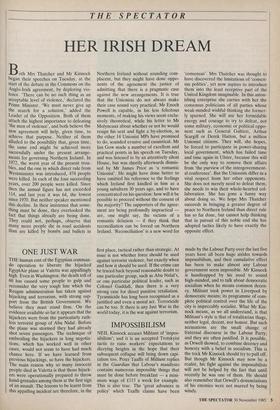THE SPECTATOR
HER IRISH DREAM
Both Mrs Thatcher and Mr Kinnock began their speeches on Tuesday, at the start of the debate in the Commons on the Anglo-Irish agreement, by deploring vio- lence. 'There can be no such thing as an acceptable level of violence,' declared the Prime Minister. 'We must never give up the search for a solution,' added the Leader of the Opposition. Both of them attach the highest importance to defeating the men of violence', and both believe the new agreement will help, given time, to achieve that purpose. Neither of them alluded to the possibility that, given time, the same end might be achieved more successfully under the present arrange- ments for governing Northern Ireland. In 1972, the worst year of the present trou- bles, and the one in which direct rule from Westminister was introduced, 474 people were killed. In each of the four succeeding years, over 200 people were killed. Since then the annual figure has not exceeded 114, and last year it was 64, the lowest since 1970. But neither speaker mentioned this decline. In their insistence that some- thing must be done, they overlooked the fact that things already are being done. They could not, perhaps, observe that many more people die in road accidents than are killed by bombs and bullets in Northern Ireland without sounding com- placent, but they might have done oppo- nents of the agreement the justice of admitting that there is a pragmatic case against the new arrangements. It is true that the Unionists do not always make their case sound very practical. Mr Enoch Powell is capable, in his less felicitous moments, of making his views seem exclu- sively theoretical, while his letter to Mr Molyneaux about whether or not he would resign his seat and fight a by-election, as the other 14 Unionist MPs have promised to do, sounded evasive and casuistical. Mr Ian Gow made a number of excellent and practical points in his speech on Tuesday, and was listened to by an attentively silent House, but was shortly afterwards dismis- sed by Mr James Prior as 'a romantic Unionist'. He might have done better to have omitted his reference to the feelings which Ireland first kindled in him as a young subaltern 30 years ago, and to have concentrated on his question: how will it be possible to proceed without the consent of the majority? The supporters of the agree- ment are being profoundly impractical — are, one might say, the victims of a romantic delusion — if they think that reconciliation can be forced on Northern Ireland. 'Reconciliation' is a new word for 'consensus'. Mrs Thatcher was thought to have discovered the limitations of 'consen- sus politics', yet now aspires to introduce them into the least receptive part of the United Kingdom imaginable. In this aston- ishing enterprise she carries with her the consensus politicians of all parties whose weak-minded wishful thinking she former- ly spurned. She will use her formidable energy and courage to try to defeat, not some military, economic or political oppo- nent such as General Galtieri, Arthur Scargill or Derek Hatton, but a million Unionist citizens. They will, she hopes, be forced to participate in power-sharing local government, which has failed time and time again in Ulster, because this will be the only way to remove their affairs from 'the purview of the intergovernment- al conference'. But the Unionists differ in a vital respect from her other opponents. She does not merely need to defeat them, she needs to win their whole-hearted col- laboration. She has gone a funny way about doing so. We hope Mrs Thatcher succeeds in bringing a greater degree of peace to Northern Ireland than direct rule has so far done, but cannot help thinking that in pursuit of this noble end she has adopted tactics likely to have exactly the opposite effect.


























































 Previous page
Previous page